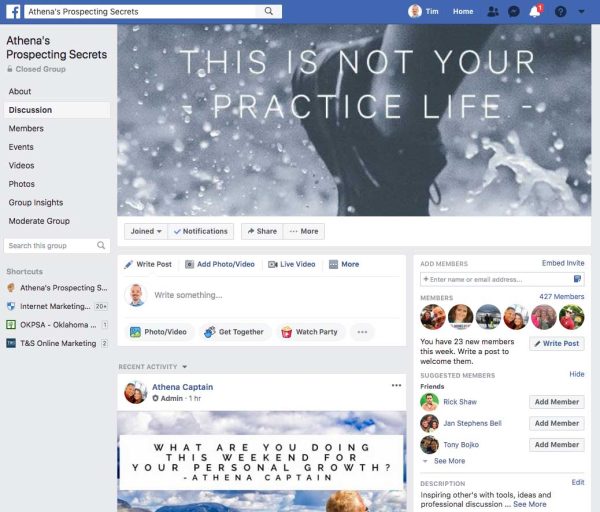Have you ever wondered how people can create a group on Facebook, get traction with it, and turn it into revenue for their business? Wonder no longer!
I recently sat down with a client and friend, Athena Captain with Turner & Son Homes. Athena shared the story of how she’s used a Facebook group to help others and build her book of business.
The beginning of the Facebook group
Back in August 2016, Athena spoke at a monthly luncheon for an association. She was quite the draw and ended up pulling in one of the biggest crowds ever for that association. She shared her story of struggles and successes. After the event, her phone wouldn’t stop ringing with people wanting to meet with her!
Athena quickly realized there was a problem. She wanted to help the people that were reaching out to her, but she didn’t have enough time to meet with all of them. That was a problem, as many of those people were potential referral partners for her.
The idea of an online community had been in the back of Athena’s mind for a while, and I had even met with the owner of her company to talk through what was involved with creating and managing one.
So in September 2016, Athena started a Facebook group called Athena’s Prospecting Secrets. It was—and still is—a closed group. People on Facebook can see that it exists, but they have to request to join it and can’t see any of the group activity until they’re approved as members.
Athena’s goals
In the beginning, Athena had two goals. Her first goal was to create a prospecting tool to connect with referral partners. Her secondary goal was to create a community of people that truly wanted information she had to share, so she could impact their lives in a positive way by helping them.
In the years since then, she’s learned that she vastly prefers impacting people’s lives. In fact, another purpose has grown out of that, which is connecting people with others that can help them when she can’t. Athena is frequently asked for advice that a marketing expert or sales trainer would be more qualified to answer. And when that happens, she connects those people with the experts in those areas.
Growing membership and engagement
A lot of the growth of the group early on was fairly organic. The group started by Athena inviting people from the association luncheon who had reached out to her. From there, those people invited their friends, and it just grew.
Now, Athena is more strategic. She frequently teaches classes, and she invites people from those classes to join the group.
Once people join the group, Athena will go check out their profile on Facebook. If they seem like the type of people that can help her accomplish her goals with the group—prospecting for referral partners, helping others, and connecting others—then she will start liking and commenting on their posts on Facebook.
The other thing Athena does to encourage engagement is to stay inspirational, transparent, and helpful. She tracks which types of posts get the most engagement, and it’s consistently the posts where she’s vulnerable. She shares challenges she’s faced or is currently facing, and then she shares how she overcame or is currently overcoming those challenges.
Getting business from the group

You may be saying to yourself, “Self, that’s all great, but how has this turned into business?” For Athena, those classes and speaking engagements I mentioned are a huge prospecting activity for her to get referral partners and eventually customers. What happens is members of the Facebook group ask Athena to come speak at their office or to a group they’re involved in.
Athena goes to speak with a focus on helping others. At the event, she invites the attendees to join her Facebook group. She also gets referrals from the attendees that connect her with actual customers. And so the process continues.
I think there are a number of important lessons we can learn from Athena’s success with her Facebook group.
Know your target market
If you don’t already have an extremely clear idea of who your target market is, you need to work on that first. Even before she started the group, Athena knew exactly what her ideal customer looked like and what her ideal referral partner looked like. That shapes who she helps with the group and makes it effective for her business.
Focus on helping others
Athena’s focus in the group—and in life—is helping others. If she were just in it to make money, she would have lost steam a long time ago in the group. The reason she’s kept up with it for multiple years is because her primary motivation is to help others, and she’s using the Facebook group as a method for doing that. And that’s why people join the group—because they believe it can help them.
It doesn’t work in a vacuum
Athena combines her Facebook group with a number of other prospecting activities, mostly speaking engagements. If she didn’t do that, it would be a challenge for her to continually grow the group and meet her goals she set with the group. And Athena’s company uses a number of other digital marketing strategies as well. The Facebook group is only one tool in their tool belt.
Be transparent
Athena looked at the data and found that the posts that had the most engagement were the ones where she shared her struggles and how she was working on them. People worry that by being vulnerable, they won’t be viewed as an expert. Get over yourself! The data backs up a vulnerable approach.
Resources for you
If this is something that interests you, there are a number of resources and tools out there that can help.
First, Facebook has several pages in their Help Center that can guide you on creating a group.
Second, the crew over at Post Planner put together a how-to guide for creating a Facebook Group. They talk about a couple different options and include some screenshots. Personally, I found it to be even better than Facebook’s own help pages.
Finally, we’ve put together a free ebook if you’re thinking of creating an online community but aren’t sure if it’s a good idea or how to get started.
Of course, if you need help setting up or managing a Facebook group (or any other online community), we’d be happy to talk and see if we’re a good fit for you or not. Contact us for a conversation.



